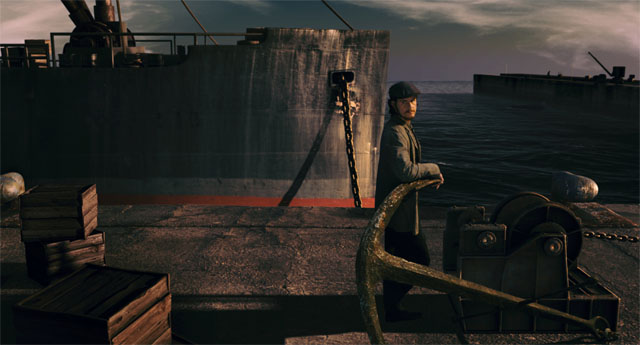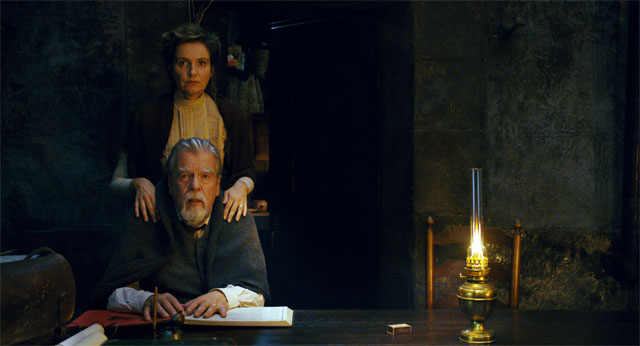“Manoel de Oliveira‘s Gebo and the Shadow opens with a lovely, green-tinted still-life of a stationed battleship, piled-up crates and a rusting anchor by a port,” writes Fernando F. Croce in a dispatch to Notebook editor Daniel Kasman. “The rest unfolds almost exclusively inside a wretched Portuguese clan’s oppressive household, with the camera never moving away from extended two-shots of commiserating characters. The patriarch (Michel Lonsdale) is mostly stooped over a paper calculating their expenses, his wife (Claudia Cardinale) complains of rituals and poverty, the daughter-in-law (Leonor Silveira) serves coffee to visitors (Jeanne Moreau and Luis Miguel Cintra). ‘We talk and we work.’ In steps the estranged young son (Ricardo Trêpa), bringing with him hints of menace and freedom…. To see the 103-year-old director recording these heavy husks of actors sitting around a table in lengthy takes is to feel his acknowledgement of mortality, as well as his search for lasting images. As one character says, simply: ‘Art consoles.'”
And Danny replies, suggesting that Gebo is the inverse of Terrence Malick’s To the Wonder—and vice versa. “Gebo, based on a play by Raul Brandão, saves its magic for outside of its single setting house, a glimpse of a Virgin Mary on a street corner, the flat, computer generated harbor you mention that opens the film, hands coming out of the shadows to grasp at the audience like the gunfighter who ends Edwin S. Porter‘s The Great Train Robbery. Is this world outside the sorrow of the household any less phantasmagoric, full of mystery and potential but also, perhaps, nothing at all, than Malick’s twirling, handheld reveries? Except Oliveira evokes this in parsimonious doses which contrast so forcefully with his long takes of old actors repeating their tasks, lamenting their lives, and attempting to cover up its true sadness in the ‘illusion’ of lying about the true sinfulness of the family’s prodigal son. And of course this illusion is cinema itself, sustaining these living, breathing, moving, talking persons in the world.”
“Although Brandão is a generation older than Eugene O’Neill, de Oliveira’s film plays out like A Long Day’s Journey into Night,” proposes Darren Hughes. “After a quick, impressionistic recreation of one of João’s crimes, de Oliveira cuts to the small room in which nearly all of the remainder of the film occurs. Sofia stands in front of a window, illuminated by candlelight, and as the camera dollies, we catch a glimpse of Doroteia in reflection. It’s a lovely shot that reveals the full physical space in which the characters exist, while also setting up the female leads as mirror images of one another. An especially nice touch is that the first image of Doroteia is blurred. At first it’s possible to mistake her for a literal reflection of Sofia, one of the film’s many reminders of the passage of time.”
“Since turning 80 at the end of 1989, he’s averaged at least one film per year,” notes Jordan Cronk at the House Next Door. “With prolificity comes inconsistency, but Oliveira has mostly sidestepped the perils of the productive by falling into a satisfying pattern of major and minor works. And I don’t mean that in qualitative terms; after all, some of his strongest works over the last decade have been small scale (I’m Going Home, Eccentricities of a Blonde-Haired Girl). Rather, Oliveira seems to compartmentalize ideas and ascribe techniques based on scope. To that end, Gebo and the Shadow is a decidedly minor work, though a rich and moving experience nonetheless. Coming off the modest memorial of Eccentricities and the nostalgic fantasia of the grand The Strange Case of Angelica, Gebo and the Shadow plays initially like further reconciliation on the part of Oliveira. But a closer look reveals a continuum: Gebo and the Shadow is a film concerned with past glories and transgressions and how we work toward (or in some cases resist) forgiveness—a death and resurrection of a different sort.”
Gebo is “a drama concerning a wayward son’s return to his clueless family that might be taken for the missing link between Strindberg and Ibsen,” writes J. Hoberman at Artinfo. “This remarkable ode to mortality addresses its subject head-on.”
“Raul Brandão’s 1923 play, also known as The Hunchback and His Shadow, may not be particularly famous outside Portugal but according to de Oliveira was a key influence on Samuel Beckett’s Waiting for Godot,” notes Neil Young in the Hollywood Reporter. Gebo is “a production of unobtrusive, old-school professionalism on the craft side, with cinematographer Renato Berta’s 35mm images rendered, in a rare concession to changing times, via digital intermediate. Berta captures the hazily soft glow of interior illumination from gas and candles, the results reminding us that Manoel de Oliveira is the only filmmaker on the planet who can actually remember what the light was really like in the 1910s.”
Boyd van Hoeij in Variety: “Though João’s philosophy, ‘We all commit crimes, at least in our minds,’ and Gebo’s admission that, ‘When money’s involved, there’s never any forgiveness,’ are a bit blunt, they point in the direction of the material’s underlying, smart exploration of the ties between wealth, happiness and lies, which resonates just as strongly today, again affirming one of de Oliveira’s recurring themes: plus ça change… The devastating yet logical closing scene is delicious in its poetic symmetry and irony.”
There’s a Manoel de Oliveira retrospective on at La Cinémathèque française in Paris through October 22, and Olivier Père has a short piece on it—in French. Gebo and the Shadow screened Out of Competition in Venice and in the Masters program in Toronto.
Venice and Toronto 2012: a guide to the coverage of the coverage. For news and tips throughout the day every day, follow @KeyframeDaily on Twitter and/or the RSS feed. Get Keyframe Daily in your inbox by signing in at fandor.com/daily.





